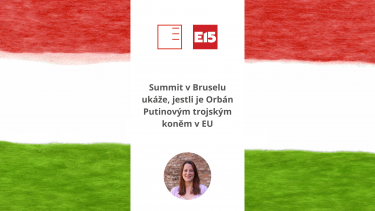RTVS | EU leaders summit decides to open accession negotiations with Ukraine and Moldova
Viktor Orbán leaves the room before the vote on the opening of accession negotiations with Ukraine and Moldova, showing his position but not blocking the move. How did the other heads of state convince him? What can we expect from the Hungarian Prime Minister in the future? Martin Vokálek, Executive Director of the EUROPEUM Institute, answered these questions for Slovak RTVS.
Show more
CNN Prima News | Orbán has been softened by the unblocking of EU subsidies. He did not veto the accession talks with the new states
The Hungarian leader has traded his consent to accession talks with Ukraine, Moldova and Bosnia-Herzegovina for European money. Or so it seems, given that right before the EU leaders' summit he announced that he would veto the move. Our deputy director Viktor Danek spoke about Hungary's position in an interview with CNN Prima News.
Show moreE15 | Summit in Brussels will show if Orbán is Putin's Trojan horse in the EU
Viktor Orbán is the only EU leader who has stated in advance that he does not intend to support the opening of accession negotiations with Ukraine. The question is what his motivations are and whether he will be softened by the unblocking of EU funding for Hungary. Our senior researcher Jana Juzová commented on Orbán's position at the Summit for the daily E15.
Show moreČT24 | Ukraine as the main topic of the ongoing EU summit
Ukraine is a central topic on the agenda of the ongoing EU summit in Brussels, both in terms of the beginning of accession talks and the provision of further financial aid to Ukraine. Does this agenda stand a chance of being approved? And what happens if Hungary decides to block the negotiations? Our senior researcher Jana Juzová spoke about the topic in an interview with ČT24.
Show morePolicy Paper | The Perception of Visegrad Group on Enlargement in light of the Russian War on Ukraine
A new policy paper, produced with the support of the Visegrad Fund project, analyses the views of the Czech Republic, Slovakia, Poland and Hungary on the further enlargement of the European Union. With the granting of candidate status to Moldova and Ukraine and the recognition of Georgia as a potential candidate in June 2022, the issue of reforming the EU accession process is becoming absolutely crucial and, in the context of the war in Ukraine, a divisive issue for the V4 countries. The authors of the publication are Jana Juzová, Ferenc Németh, Tomáš Strážay and Marta Szpala.
Show moreOp-Ed | The grain dispute is the first sign that Ukraine's EU accession will not be easy. What obstacles await on this path?
The Ukrainian grain situation is making waves in Europe. Deputy Director and Head of the Brussels Office Ziga Faktor wrote an Op-Ed about the impact of the situation on the country's EU accession and how some member states are reacting.
Show more
TV Nova | Hungary before the European Parliament elections
The election campaign for the European Parliament elections in Hungary has begun, and according to expectations, it is quite sharp. But what is Hungary's real position in the current European Union? And how might the proposed reforms or enlargement of the Union change it in the future? Our deputy director Viktor Daněk commented on the issue in an interview with TV Nova.
Show morePrávo | Tusk's death sentence over the V4
The alliance between the Czech Republic, Slovakia, Hungary and Poland is weakening more and more and the possibility of a Donald Tusk's government in Poland will certainly not help the V4 to come together again. Viktor Daněk, deputy director of EUROPEUM, commented on this topic for the newspaper Právo.
Show moreRevivEU
RevivEU project, carried out by four leading institutions in the V4 countries, looks at the needs, concerns and fears of the V4 citizens in four various EU-related topics. It does so through both quantitative and qualitative research of citizens´ attitudes towards climate change, migration, covid-19 and the rule of law. It also analyses the governmental policies in these four main areas and how the communication of these policies is framed in the public discourse.
Show moreČeský rozhlas Radiožurnál: New migration politics of European Union
In matters of migration and internal affairs, voting in the EU is made by a qualified majority. However, representatives of Hungary and Poland are in favor of a unanimous decision. For Radiožurnál, our senior researcher Vít Havelka commented on the issues of the new EU migration policy.
Show more
Staroměstské náměstí 4/1
Prague 1 - Staré Město
110 00
tel.: +420 212 246 552
email: europeum@europeum.org
https://www.europeum.org







